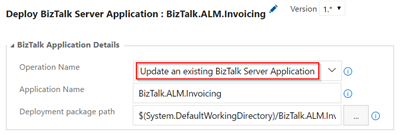In case you are interested in a detailed walk-through on how to set up continuous deployment, please check out this blog post on Continuous Deployment in BizTalk 2016, Feature Pack 1.
What is included?
Below, you can find a bullet point list of features included in this release.
- An application version has been added and can be easily specified.
- Automated deployment from VSTS, using a local deploy agent.
- Automated deployment of schemas, maps, pipelines and orchestrations.
- Automated import of multiple binding files.
- Binding file management through VSTS environment variables.
- Update of specific assemblies in an existing BizTalk application (with downtime)

What is not included?
This is a list of features that are currently not supported by the new VSTS release task:
- Build BizTalk projects in VSTS hosted build servers.
- Deployment to a remote BizTalk server (local deploy agent required)
- Deployment to a multi-server BizTalk environment.
- Deployment of shared artifacts (e.g. a schema that is used by several maps)
- Deployment of more advanced artifacts: BAM, BRE, ESB Toolkit…
- Control of which host instances / ports / orchestrations should be (re)started
- Undeploy a specific BizTalk application, without redeploying it again.
- Use the deployment task in TFS 2015 Update 2+ (no download supported)
- Execute the deployment without the dependency of VSTS.
Conclusion!
Microsoft released this VSTS continuous deployment service into the wild, clearly stating that this is a first step in the BizTalk ALM story. That sounds very promising to me, as we can expect more functionality to be added in future feature packs!
After intensively testing the solution, I must conclude that there is a stable and solid foundation to build upon. I really like the design and how it is integrated with VSTS. This foundation can now be extended with the missing pieces, so we end up with great release management!
At the moment, this functionality can be used by BizTalk Server 2016 Enterprise customers that have a single server environment and only use the basic BizTalk artifacts. Other customers should still rely on the incredibly powerful BizTalk Deployment Framework (BTDF), until the next BizTalk Feature Pack release. At that moment in time, we can re-evaluate again! I’m quite confident that we’re heading in the good direction!
Looking forward for more on this topic!
Toon
Subscribe to our RSS feed